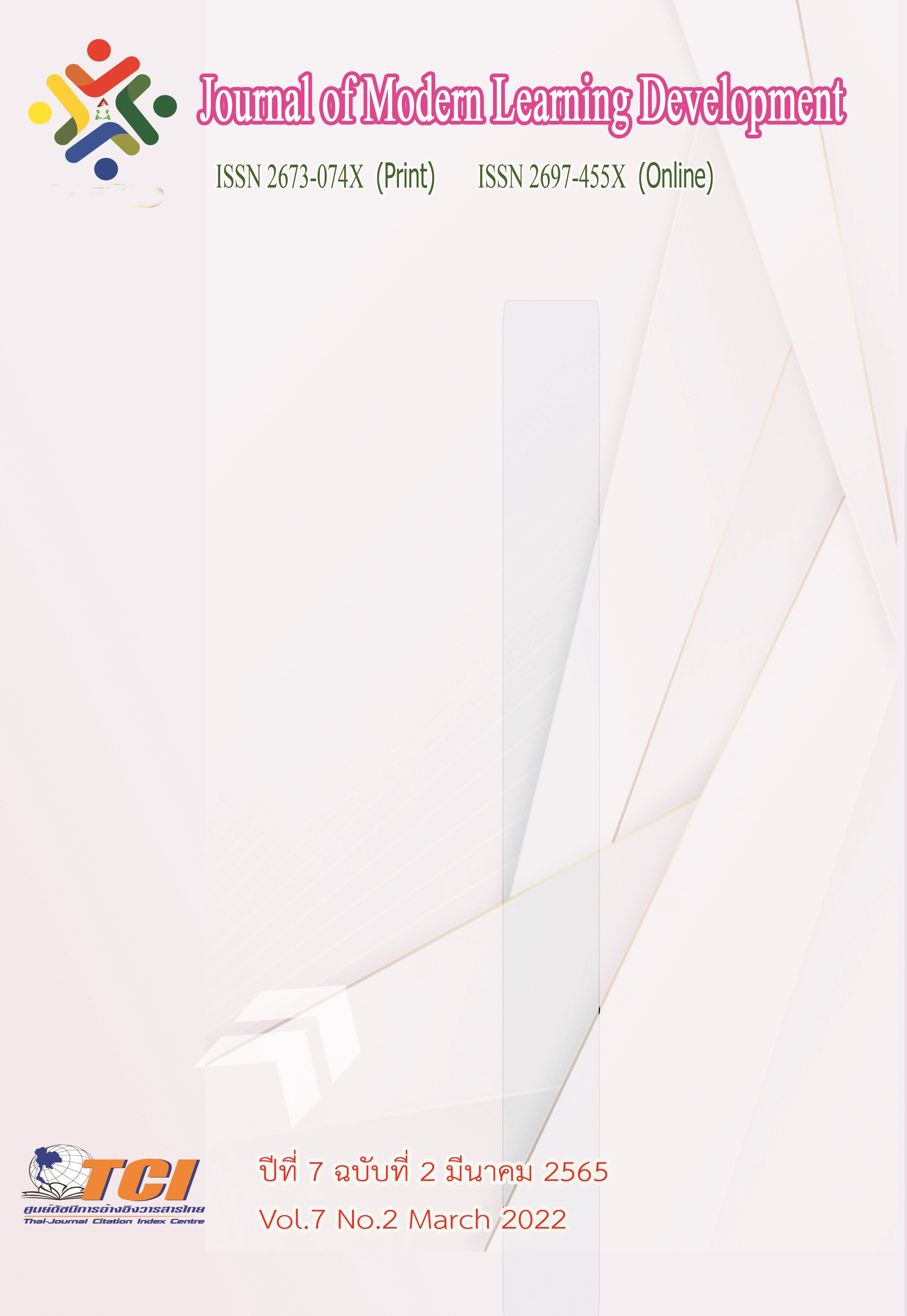A Model for Agroforestry Management Based on the Principles of Sufficiency Economy Philosophy for a Good Model of Sustainable Community : A Case Study of Agroforestry Areas in Home Village, Yang Talad District, Kalasin Province
Main Article Content
Abstract
The purposes of this research were to 1) study the factors in agroforestry management, 2) analyze factors in achieving the success, 3) investigate factors of risk or failure, 4) study the objectives, principles and components of agroforestry, 5) analyze factors affecting the objectives, principles and components of agroforestry management based on the principles of “Sufficiency Economy Philosophy” 6) design a good model of agroforestry management The mixed method of quantitative research and qualitative research was employed for the study. The qualitative research was used to synthesize the factors through focus groups of eighteen participants selected by purposive sampling. The data was analyzed by descriptive method for explaining and discussing research results. The quantitative data was collected by a questionnaire from three hundred and forty four research samples. Taro Yamane method was employed for calculating the sample size. The research statistics used were frequency, percentage, mean, and standard deviation. Stepwise method was used for hypothesis testing at the .01 level of statistical significance.
The research results showed that 1) factors affecting agroforestry management were, The average level of the factors affecting the agroforestry management was 3.68. 2) Ten factors affecting the success in managing the agroforestry management consisted of farmers, The average level of the factors affecting the success in managing the agroforestry management was 3.72. (3) factors in risk and failure of the agroforestry management included farmers, The average level of the factors affecting the risk and failure of the agroforestry management was at a moderate level (3.30). (4) The objectives, principles and components of agroforestry management were solving poverty, The average level of the objectives, principles and components of agroforestry management was at a high level (3.76). (5) The equation of the factors affecting the objectives of agroforestry management based on the principles of sufficiency economy philosophy consisted of intention, understanding concept, water, and planning for growing. The factors affecting the success in managing agroforestry included inspiration, capital, group creation, patience, knowledgeand risk and failure. The factors of the external environments were general external environment, society and disaster. 6) The model for agroforestry management based on the principles of sufficiency economy philosophy for a good model of sustainable community in Kalasin Province consisted of intention of the farmers, understanding concept, water, planning for growing, inspiration, capital, group creation, patience, knowledge, general external environments, society and disaster.
Article Details
References
ขวัญกมล ดอนขวา. (2557). แบบจำลองปรัชญาของเศรษฐกิจพอเพียงและเศรษฐกิจสร้างสรรค์มีผลต่อการพัฒนาเศรษฐกิจของประเทศไทย. รายงานการวิจัย. นครราชสีมา: สถาบันวิจัยและพัฒนามหาวิทยาลัยเทคโนโลยีสุรนารี.
ธงชัย สันติวงษ์. (2543). องค์การและการบริหาร. (พิมพ์ครั้งที่ 11). กรุงเทพมหานคร: ไทยวัฒนาพานิช.
พระชยานันทมุนี และคณะ. (2561). หมู่บ้านพุทธเกษตร : รูปแบบการจัดการป่าและการส่งเสริมสัมมาชีพของเกษตรกรวิถีพุทธสู่ความยั่งยืนในพื้นที่จังหวัดน่าน. รายงานการวิจัย. อยุธยา: มหาวิทยาลัยมหาจุฬาลงกรณราชวิทยาลัย.
รังสรรค์ หังสนาวิน. (2557). คู่มือการดำเนินงานโครงการหมู่บ้านเศรษฐกิจพอเพียงต้นแบบ. กรุงเทพมหานคร: สำนักส่งเสริมความเข้มแข็งชุมชน กรมการพัฒนาชุมชน.
วัชรินทร์ สุทธิศัย และสิทธิพรร์ สุนทร. (2563). การวิจัยและวิทยานิพนธ์ทางสังคมศาสตร์. เอกสารประกอบการสอน หลักสูตรสาขาวิชาการจัดการภาครัฐและภาคเอกชน คณะรัฐศาสตร์และรัฐประศาสนศาสตร์ มหาวิทยาลัยราชภัฏมหาสารคาม.
วิชุตตา ชูศรีวาส. (2559). การดำเนินงานหมู่บ้านเศรษฐกิจพอเพียง บ้านหัวอ่าว ตำบลบางช้าง อำเภอสามพราน จังหวัดนครปฐม. รายงานการวิจัย. กรุงเทพมหานคร: สำนักส่งเสริมวิจัยและนวัตกรรม มหาวิทยาลัยราชพฤกษ์.
วิรัช วิรัชนิภาวรรณ. (2545). การบริหารเมืองหลวงและการบริหารท้องถิ่น : สหรัฐอเมริกา อังกฤษ ฝรั่งเศส ญี่ปุ่นและไทย. กรุงเทพมหานคร: สำนักพิมพ์โฟร์เพซ.
ศุภชัย ยาวะประภาษ (2548). นโยบายสาธารณะ. (พิมพ์ครั้งที่ 6). กรุงเทพมหานคร: สำนักพิมพ์จุฬาลงกรณ์ มหาวิทยาลัย.
สุภาพร ปาแก้ว. (2553). การใช้ประโยชน์ที่ดินแบบวนเกษตรและการอนุรักษ์ทรัพยากรธรรมชาติของบ้านแม่สาบ ตำบลสะเมิงใต้ อำเภอสะเมือง จังหวัดเชียงใหม่. วิทยานิพนธ์ วิทยาศาสตรมหาบัณฑิต. บัณฑิตวิทยาลัย: มหาวิทยาลัยเชียงใหม่.
สุเมธ ตันติเวชกุล. (2550). ใต้เบื้องพระยุคลบาท. กรุงเทพมหานคร: สำนักพิมพ์มติชน.
สรรเสริญ วงศ์ชอุ่ม. (2546). การพัฒนาประเทศ. กรุงเทพมหานคร: จุฬาลงกรณ์มหาวิทยาลัย.
เอนก ดีพรมกุล. (2560). การเปรียบเทียบภูมิปัญญาท้องถิ่นระหว่างการทำสวนวนเกษตรกับสวนผลไม้ผลเชิงเดี่ยว : กรณีศึกษาสวนลองกองในบ้านขุนห้วย ตำบลนานกกก อำเภอลับแล จังหวัดอุตรดิตถ์. วิทยานิพนธ์ วิทยาศาสตรมหาบัณฑิต. บัณฑิตวิทยาลัย: มหาวิทยาลัยเชียงใหม่.


